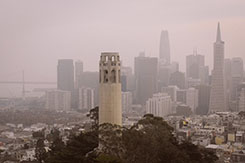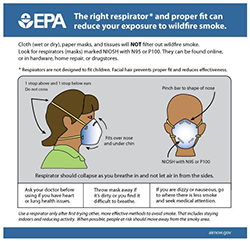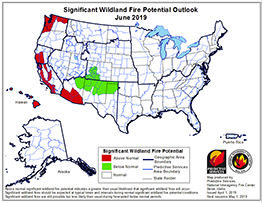Wildfires and Smoke
 Wildfires can produce a lot of smoke. Fine particles, called “particle pollution,” are the pollutant of most concern in wildfire smoke. These microscopic particles can get deep into your lungs. They can cause many health problems from burning eyes and runny nose to aggravation of chronic heart and lung disease, leading to emergency department visits, hospital admissions and even premature death. Anyone with heart and lung disease is especially at risk. While not everyone reacts the same way to wildfire smoke, it’s always a good idea to reduce your exposure to smoke.
Wildfires can produce a lot of smoke. Fine particles, called “particle pollution,” are the pollutant of most concern in wildfire smoke. These microscopic particles can get deep into your lungs. They can cause many health problems from burning eyes and runny nose to aggravation of chronic heart and lung disease, leading to emergency department visits, hospital admissions and even premature death. Anyone with heart and lung disease is especially at risk. While not everyone reacts the same way to wildfire smoke, it’s always a good idea to reduce your exposure to smoke.
How can I get ready for fire season?
If you live where the chance of wildfire is high, take steps to prepare during the cooler and wetter months before fire season starts. If you live in or near wildlands, contact your nearby federal or state forestry agency for up-to-date information on wildfire risk. Remember, smoke can travel to locations far away from fires, so it is good to know how to reduce your smoke exposure wherever you are. Being prepared is especially important for people with heart or lung disease, older adults and children. Here are some ways to get ready for fire season:
Talk to your health care provider if you have heart or lung disease. Ask what you should do during wildfire smoke events and have a plan to manage your condition. The Environmental Protection Agency and Centers for Disease Control and Prevention have an online course, Particle Pollution and Your Patients’ Health for medical professionals (physicians, nurses, and health educators) that covers particle pollution and health, and offers continuing education credits.
Know how you will get emergency alerts and health warnings. Check the AirNow website or your state’s air quality website for the latest outdoor air quality information.
Stock up on food, medicine, and other essentials so you don’t have to go out when it’s smoky. Have enough medication on hand to last several days. Buy groceries that do not need to be refrigerated or cooked. Frying and broiling can add to indoor air pollution.
More Fire Tools
- Prepare for Fire Season Factsheet
(2 pp., 260KB, about PDF) - Learn how to protect your health from wildfire smoke.
- Indoor Air Filtration Factsheet
(2 pp., 122KB, about PDF)
- Reduce Your Smoke Exposure Factsheet
(2 pp., 819KB, about PDF)
- Protect Yourself From Ash Factsheet
(2 pp., 845KB, about PDF)
- Respiratory Protection Factsheet
(2 pp., 321KB, about PDF)
Learn more about the fire managers who help communities understand and respond to air quality impacts from fire and smoke.
How can I get my home ready?
When it’s smoky outdoors, try to stay indoors. Remember, smoke from outside can enter your home and affect the indoor air quality as well. EPA’s new web site Wildfires and Indoor Air Quality (coming soon!) can help you learn how smoke enters your home and what you can do about it. Here’s how you can prepare:
Buy a portable air cleaner before there is a smoke event. Make sure it does not make ozone and it is the right size for the room where you plan to use it.
Ask a heating, ventilation and air conditioning (HVAC) professional what kind of high efficiency filters (rated MERV 13 or higher) you can use in your home’s HVAC system. Learn how to close the fresh-air intake if your HVAC system or room air conditioner has one.
Learn how to create a “clean room” in your home where you can shelter in place. Choose a room with no fireplace and as few windows and doors as possible, such as a bedroom, where you can shelter in place. Plan to use a portable air cleaner in the room.
What if I need to go outside?
In smoky situations, spend as little time outside as you can. If you must go outside, here’s what you can do:

The right respirator and proper fit can reduce
your exposure to wildfire smoke
Click Infographic to enlarge
Take it easier during smoky times to reduce how much smoke you inhale. If it looks or smells smoky outside, avoid strenuous activities such as mowing the lawn or going for a run.
Use the recirculate mode in your car’s air conditioner.
How can I protect my animals?
 Your pets and livestock are affected by smoke. Keep them healthy by avoiding smoky areas and limit physical activity. New factsheets about protecting pets and protecting livestock, developed with the American Veterinary Medical Association, offer guidance for protecting your pets and large animals.
Your pets and livestock are affected by smoke. Keep them healthy by avoiding smoky areas and limit physical activity. New factsheets about protecting pets and protecting livestock, developed with the American Veterinary Medical Association, offer guidance for protecting your pets and large animals.
How can I protect myself from ash from the smoke?
Thoroughly clean yourself with soap and water as soon as possible. Ash may contain a variety of chemicals that could irritate exposed skin.
Wash any vessels or utensils used for food preparation or consumption. These should be cleaned prior to use if there is a possibility that they are contaminated.
